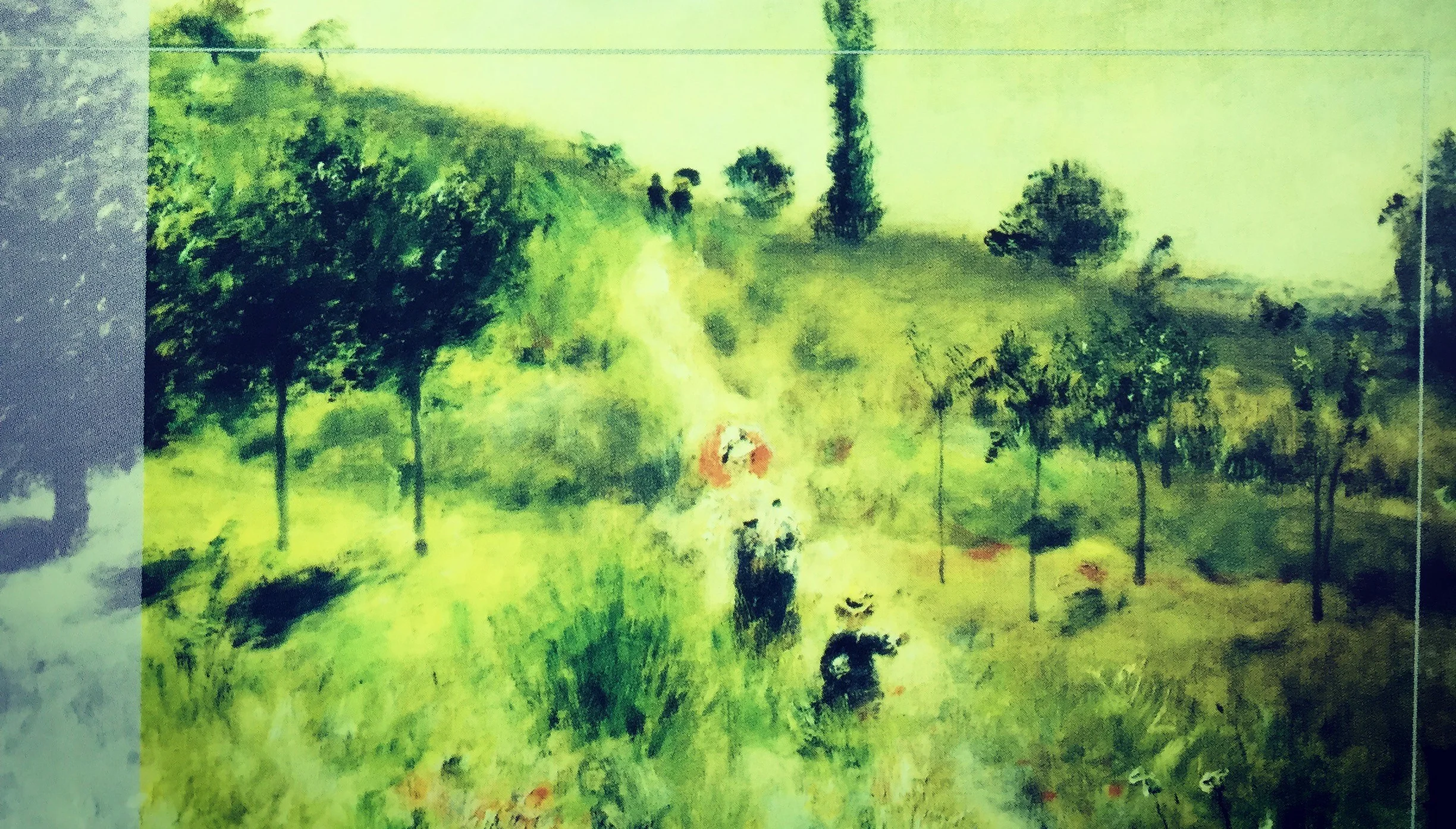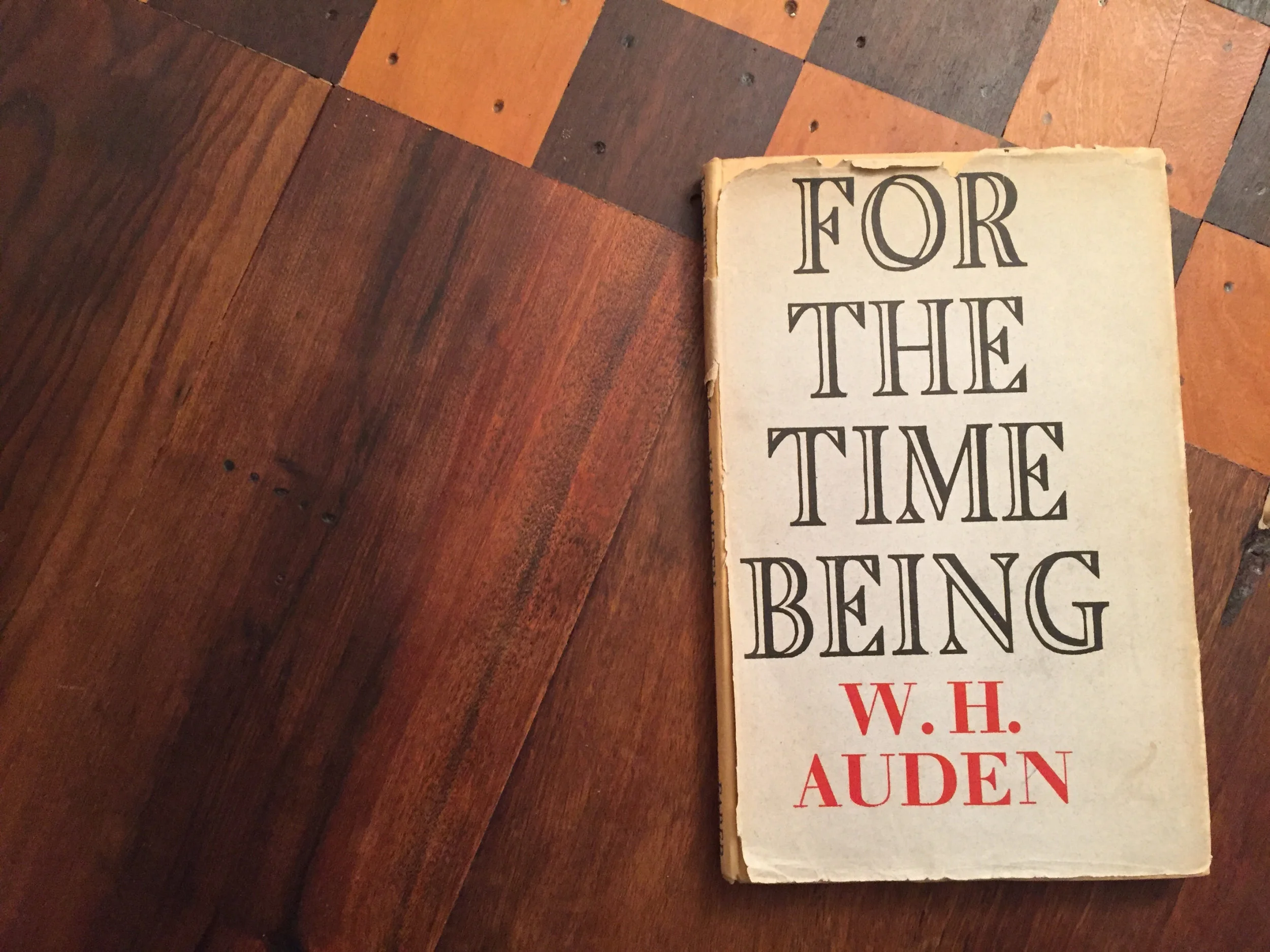Reading American Gods and Measuring Cult Fiction
That we’ve broken their statues,
that we’ve driven them out of their temples,
doesn’t mean at all that the gods are dead.
O land of Ionia, they’re still in love with you,
their souls still keep your memory.
When an August dawn wakes over you,
your atmosphere is potent with their life,
and sometimes a young ethereal figure,
indistinct, in rapid flight,
wings across your hills.
"Ionic" - CP Cavafy
Translated from the Greek by Edmund Keely and Phillip Sherrard
A few days before moving out of the old apartment I received two books in the mail from a friend, for my birthday. The first was Virginia Woolf's To the Lighthouse, and the second was American Gods by Neil Gaiman. My friend slipped a post-it note to the top that said, "I'm sending you books right before you move. I'm the worst."
We had talked about American Gods about a month earlier when I was visiting Denver for work. She sipped her hard cider in a bar and gave me the rundown.
"There's a man named Shadow and he has just gotten out of prison. His wife has just died. On his way home, Shadow meets a man named Mr Wednesday, who offers him a job."
I sipped my drink and looked at her dubiously.
"Shadow and Wednesday then journey all around the country. In the novel, gods are real and they live pretty anonymous lives in America and you could see them every day and probably not realize it."
My knowledge about Gaiman stopped at knowing he's crazy famous, especially for his Sandman graphic novel series. I told myself first, You usually don't like trippy fiction.
But perhaps in a way like Gaiman when he first thought up the tremendous title -- before he had written anything -- I told myself I'd give it a try. After a four month trip to Greece I was enticed by the idea of what the altars would be for American gods. Who'd be in the Pantheon. What would they be like.
I've been an avid reader of CP Cavafy for a few years now. Cavafy, the modern Greek poet who wrote about the persistence of ancient mythology in modern life, was often my reference point for reading American Gods. At times, that may have been my fault. Gaiman's novel is his own thing. It's not Greek. Neither is it particularly British, despite its author's emigration from England to the American midwest. American Gods though is Americulty. It performs Americana impeccably.
The cult following of American Gods is a hard thing to get around when you start reading. I read in the Introduction by the author that fans recreated their own road trips fashioned after Shadow and Wednesday's itinerary, visiting small stops in Wisconsin and tourist attractions outside Chattanooga, TN. Sites where grim deaths took place above Sunset Blvd in Los Angeles or any other spot where burly intimidation tactics were employed in other towns across the United States -- became pilgrimages for fans of fantastical literature. I read in an interview with Neil Gaiman that a crafty bank robbery (that happened in the novel) was actually recreated up in Canada.
And still, I imagine many of these readers were a lot like me -- people who don't normally go for science fiction.
This review won't be so much about the book itself or whether I think you should read it. (Read it, for all I care. Or watch the forthcoming television series being made.) What I would rather talk about is the bizarre experience of reading American Gods. The state of mind in a cult-ishly infectious novel won't apply to everyone. But when a book is so unapologetically what it is and you're entranced all the same that you stick with it for those 500+ pages, something in you changes.
My friend's introduction to the plot, that it's a journey story where the gods are real, modern, resembling us much, is a great intro -- but the novel's structure is broken glass. There is a main narrative with Shadow, a man mourning his wife's death. The novel also interludes segments called "Coming to America" which give us immigrant stories of how the Nordic gods arrived with the Vikings, or the gods that came with the nomadic tribes we now call Native Americans. Slaves brought over from African nations whispered prayers to their gods and the immortal gods stayed through generations. The gods keep their power by our believing in them, the premise goes.
The crisis is that once they've arrived in the new land, people came up with new gods while the old gods did their best to survive as they lose their relevance. And like any pantheon, America's gods are chock full of tricksters.
A chief theme of the novel is the replacement of mythology with television and modern technology. So not surprisingly, American Gods is less a theogony or mythology as a noir.
Cruelty is as cynical as a cartoon. Interactions are gimmicks and wiseass asides. To play ball, you need to accept a world where both I Love Lucy and Odin are -- or have been -- revered with equal obeisance. Gaiman doesn't try to be a realist, rather the novel is about studying a sleight of hand, like a magician who palms coins to then pluck them from thin air. It strives after a tone that is very American.
I loved reading much of AG. Gaiman's gift for diverting the reader's attention while still catching certain mannerisms you find almost exclusively in the middle of the country is delightful. When Wednesday robs a bank in small-town Wisconsin by impersonating a security guard, I was in stitches while reading the following scene:
And then the cops drew up outside the bank, and Shadow's heart sank. Wednesday tipped his cap to them and ambled over to the police car. He said his hellos and shook hands through the open window, and nodded, then hunted through his pockets until he found a business card and a letter, and passed them through the window of the car. Then he sipped his coffee.
The telephone rang [across the street]. Shadow picked up the hand piece and did his best to sound bored.
Shadow then impersonates the head of security, threatening that if Wednesday's been drinking on the job, "He's fired. You got that? Out of a job. Out on his ass. We have zero tolerance at A1 Security."
And still, while the noir themes are thoroughly amusing, the novel suffers several damages for them. A woman's lips are always ruby or crimson. Sex is often a vulgar thing. Gaiman can spin up wonderful sentences, but some segments are insufferably dull. We once journey through the afterlife and meet several spirit creatures, every one of which begins with "Hi, hello, how are you, I'm fine, how are you, fine".
These kinds of issues are what Mark Twain called "offenses" in the "inventive faculty" of James Fenimore Cooper. Borrowing Twain's lens felt necessary when reading sections of American Gods. Like Cooper's mythical characterizations of America, we also get weird inconsistencies even to the science fictiony, fantastical world we're playing nice to accept. In a late scene a man is dying a pretty brutal death and we get a long passage detailing the suffering, yet he then has an odd exchange with a god where he answers "politely". In another scene, while running out to the middle of a frozen lake, Shadow narrates himself running on the lake, claiming he feels like the hero of a movie.
When you're a living human, capable of imagining gods, and you have unregulated jurisdiction over such a flexible language --imperfect thought it may be -- it's disappointing to read such cinematic analogies, especially when the crux of American Gods is the imperial presence of televisual worship. The mise en scene becomes a pretty pathetic moment.
I love the plot Gaiman builds. I was enthralled by his ironies when they're skillfully employed. Several times while reading it, I also recommended it to friends who I thought would like it. But these lapses in language, where irony is undermined by clumsiness, present an irksome problem to laying out the tone of our nation. "Use the right word," Twain writes when chastising Cooper, "not its second cousin."
When a writer pursues any national tone, whether a reverential one or a damning one, it should never be in exchange for bad or blurry prose. Sometimes you'll hear conversations in undergrad classrooms derail when Irony is brought up. He uses film tactics to undermine film tactics. Well. Fine.
To come away from a novel about America, I should have a clearer sense of what the hell America is -- right?
-- right?
When I finally closed the book, I wanted to read more about the gods. (Gaiman actually has a book forthcoming about Norse mythology. When it's out, I'd like to read it.) I feel weird getting sour over a few details, especially in a novel I overall enjoyed. My reasons to keep reading AG were different then my reasons to initially read it. Originally I just wanted to see what the hype was about. I thought it'd be escapist -- I had just moved, was transitioning. It had been a long time since I felt deeply invested in a novel. And the novel for the most part delivered. Reading it on the bus to and from work produced a lot of laughs.
Gaiman's sense of humor regarding American strangeness aligns with my own. If you read my travel stories, you'll see that I also revel in the slow panning of America's unusual footage. Shadow's struggle to transition back to normal life was felt powerfully. His difficulty to forgive his wife's infidelity is dragged out for several hundred pages. The deception of his closest friends is felt for a lifetime.
My level of engagement with the novel fluctuated while reading it over the course of a month. My opinions on what Gaiman should or shouldn't be writing both aroused in flames and purred to an ashy coal. When I'd go through these personal ups and downs, I would think about those readers that packed up the car to travel around America, following the book's itinerary.
So I return again to the cult following of American Gods. The experience of reading it is different than reading other books in modern English lit. Generally, as a reader, I'd so much rather take a nap than putting time into a book I don't love. I know there are readers who say that once they start a novel they can't quit, regardless of whether or not they hate it. I feel no guilt about quitting, by any means. Wish it was different, but that's me.
The cult of a book like American Gods is palpable when you read it. You feel similarly when reading certain poems by Allen Ginsberg or Frank O'Hara. When Kurt Vonnegut first says "So it goes" in Slaughterhouse-Five, you'll know the sensation then. If you've ever sat around watching movies -- incredulously -- like Clerks or Harold and Maude, then you find yourself among strangers in an even stranger, ethereal and American altar.
When I started to pine for other novelists and the literary styles I simply like better (at different points authors like Toni Morrison, Don DeLillo, David Foster Wallace, and Jhumpa Lahiri came to mind) I still persisted with Gaiman. I'd say these four novelists deal with technology, immigration, religion, and modern America in ways far superior to American Gods. When Shadow would dip into another dream sequence (which he seemed to do every couple dozen pages) I wished out loud that I could re-read from the above list for the first time again. But I didn't stop reading it to try another book, which I now look at curiously.
In digital marketing, you measure a piece of content's success with page views, unique page views, time spent on page, exit rates, and the most interesting metric -- bounce rate. In Google Analytics, a "bounce" means when someone leaves a web page before engaging with it. Buzzfeed, for an example, has a bounce rate of 64.10% -- according to Alexa.com. For a news site that publishes wildly popular content that spreads like wildfire, and much of it inane, it's pretty good for only 35.9% to stick around.
So how should we measure the pleasurableness of Gaiman's modernization? Nearly forgotten names from the Bible, African myths, Nordic lore, Native American prayers, they all get their moment to be remembered and revered.
At a certain tipping point, being "viral" is reason enough for people to start reading or watching a piece of content. You can like or share a meme in part because it was liked and shared by so many others. Is American Gods one of these memes? Is it kind of like one of these viral pieces of content?
How do we measure popular fiction with a cult following?
Keeping at a novel for several hundred pages takes more work than reading a meme or watching a cat's funny trick. However, in academic circles a reader's persistence through their own work-related/life-related/political-wreck-related fatigue is never a metric for literary worth. But the tactics employed by these novels to persist into the lives of convenience-seekers is even more poorly understood.
By one method we could view it like a digital marketer might, under a new measurement of engagement. How do readers engage with it among other readers? Do people share who aren't normally engaged readers? Are they likely to read more because of their experience? Does it bother them to read the comments?
My growing feeling of disagreement with various bookish types still feels more engaged and kindred than other pieces of divisive content I read online. There's enough shared space to join and contradict my expectations, and there's enough pushback that aims to make better readers.
But so long as we're discussing the persistence of culture, the indistinct and winging figures, we should always be asking how much our land is in love with it.





